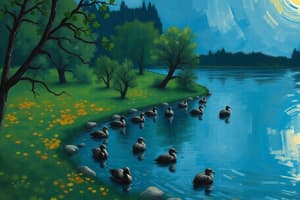Podcast
Questions and Answers
What is economics?
What is economics?
Study of how we choose to use limited resources to obtain the maximum satisfaction of unlimited human wants.
What does scarcity mean?
What does scarcity mean?
Limited resources.
What are needs?
What are needs?
Something that is necessary to live and function.
What are wants?
What are wants?
What are resources in economics?
What are resources in economics?
What does capital refer to in economics?
What does capital refer to in economics?
What is the Free Lunch Principle?
What is the Free Lunch Principle?
What is opportunity cost?
What is opportunity cost?
What is microeconomics?
What is microeconomics?
What does the Law of Increasing Opportunity Cost state?
What does the Law of Increasing Opportunity Cost state?
What is a Demand Schedule?
What is a Demand Schedule?
What is the effect of a normal good when income increases?
What is the effect of a normal good when income increases?
What happens to the demand of an inferior good when income increases?
What happens to the demand of an inferior good when income increases?
In economic terms, labor represents only mental work.
In economic terms, labor represents only mental work.
Which of the following are factors of production?
Which of the following are factors of production?
The circular flow model describes the movement of __________ in the economy.
The circular flow model describes the movement of __________ in the economy.
What does the substitution effect refer to?
What does the substitution effect refer to?
Flashcards are hidden until you start studying
Study Notes
Economics Overview
- Economics examines the choice of utilizing limited resources to maximize satisfaction from unlimited human desires.
- Efficient resource allocation is crucial to address scarcity, where resources are insufficient to fulfill all needs and wants.
Key Concepts
- Marginal refers to any additional or extra change in an economic variable.
- Scarcity defines limited resources that hinder the ability to meet everyone's needs and wants.
- Needs are essentials required for survival, while wants are non-essential desires that enhance quality of life.
Resources in Economics
-
Factors of Production: Resources include land, labor, capital, and entrepreneurial ability.
-
Land: Involves natural resources; can be renewable (e.g., plants) or exhaustible (e.g., oil).
-
Labor: Human capital contributes to production, encompassing both physical (blue-collar) and mental (white-collar) work.
-
Capital: Comprises infrastructure, machinery, and human skills necessary for production.
-
Human Capital: Encompasses the skills and knowledge of individuals.
-
Entrepreneurial Ability: Refers to innovation and risk-taking within the economy, generating profit from land (rent), labor (wages), and capital (interest).
-
Economic Principles
- Free Lunch Principle: No costless goods or services; resources used have alternative uses.
- Rational Self-Interest: Individuals aim to maximize benefits while minimizing costs for optimal satisfaction.
Opportunity Cost
- Opportunity cost is the value of the best alternative given up when making a choice, not easily quantified monetarily.
Microeconomics
- Focuses on individual consumers and firms, analyzing market behaviors, performance, and decision-making in the economy.
- Circular Flow Model: Illustrates the movement of resources and goods between sectors of the economy.
Production Possibility Frontier (PPF)
- A model showcasing scarcity, choice, and opportunity costs, illustrating efficient production combinations of two goods.
Law of Increasing Opportunity Cost
- As the production of one good increases, the cost of producing additional goods rises due to resource reallocation.
Demand and Consumer Behavior
- Describes the relationship between price, quantity demanded, and consumer satisfaction; higher prices decrease demand, while lower prices increase it.
- Demand Schedule: A tabulation of prices with corresponding quantities demanded.
Income and Demand
-
Disposable Income: Income available after taxes for household spending.
-
Discretionary Income: Remaining income after necessities are covered, available for savings or discretionary purchases.
-
Income Effect: Changes in demand following adjustments in the consumer's discretionary income.
-
Normal Good: Demand increases with rising income.
-
Inferior Good: Demand decreases as income increases.
-
Substitutes and Complements
- Substitutes: Goods fulfilling similar needs; price increase in one leads to demand increase for the other (substitution effect).
- Complementary Goods: Products typically consumed together; demand for one increases the demand for the other.
Consumer Expectations
- Expectations about future prices and availability can greatly affect current demand patterns and market behaviors.
Studying That Suits You
Use AI to generate personalized quizzes and flashcards to suit your learning preferences.




